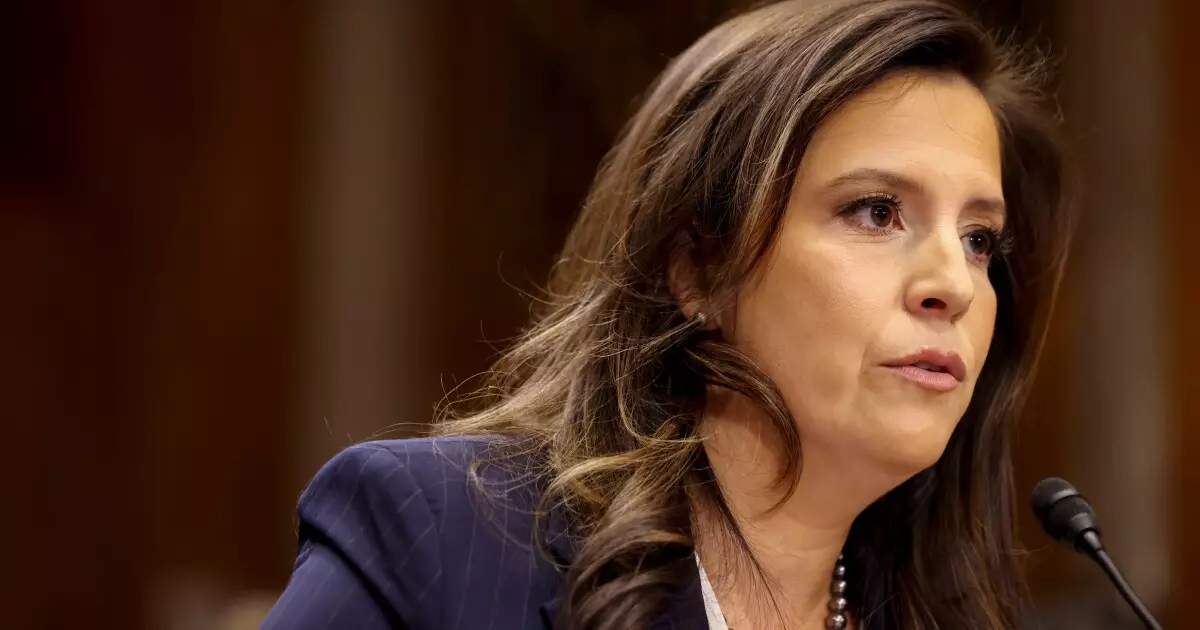In a move that has sent ripples through both the financial and educational sectors, Republican Representative Elise Stefanik has directed a keen eye towards Harvard University’s recent bond sale. On April 9, the prestigious institution issued a $750 million taxable bond. However, a supplementary disclosure issued just days later sparked concerns over potential misinformation provided to investors regarding the implications of strained relations with the Trump administration. This inquiry into Harvard’s transparency, led by Stefanik, highlights a fundamental issue concerning the integrity of financial disclosures by institutions that sit atop the hierarchies of education and social relevance.
Amid rising scrutiny, Stefanik posits that there may have been deliberate omissions in Harvard’s disclosures. The bond documentation presented on April 9 and the subsequent addendum on April 15 significantly differed in acknowledging the risks posed by federal actions against Harvard. This disparity raises pressing questions: Did Harvard already plan to reject federal aid conditions before initiating its bond offering? Such an assumption would constitute a serious breach of federal securities law by obscuring relevant risks from potential investors.
From my perspective, Harvard’s reputed standing in the academic realm does not absolve it of its responsibilities to its stakeholders, including investors who expect full disclosure. It is not an isolated case of institutional oversight but a broader narrative about how elite universities navigate political landscapes while handling significant financial dealings.
The Implications of Binding Contracts
To contextualize the implications, one must consider the role of the Securities and Exchange Commission (SEC). By launching an investigation into Harvard’s actions, the SEC would not only address Stefanik’s concerns but also reinforce the principle that no institution, regardless of stature, is above scrutiny. Stefanik’s call for investigation taps into a vital societal concern: transparency in financial dealings. If universities, equipped with vast endowments and expansive reputational power, engage in practices that mislead investors, it constitutes a severe violation of ethical standards in the finance sector.
While some may dismiss the notion of impropriety as political posturing, the investor community—represented by experts like Jeff Timlin—emphasizes the necessity for a thorough investigation. The financial marketplace thrives on trust; any perceived misconduct can trigger unsettling repercussions permeating through the ecosystem. Hence, the call for an inquiry should not be perceived as a mere political tactic but rather as a call for accountability in an age where the lines between academia and the financial sector blur.
Harvard’s Defense: A Question of Timing
In response to allegations from Stefanik, Harvard has robustly defended its actions through its spokesperson, arguing the timing of events prevented foresight regarding the government’s evolving actions. On April 15, the university claims it acted to provide additional information that accurately reflected unforeseen federal pressures, showcasing an apparent commitment to transparency as soon as the situation became clearer.
Even with this defense, skepticism remains. After all, Harvard holds an enviable triple-A rating from both Moody’s and S&P Global, making its financial practices a focal point for critique. The legitimacy of its operations becomes essential not only for its stakeholders but also for the broader financial landscape where such a prominent institution serves as a beacon for responsible investment practices. Confidence in established institutions like Harvard lays the groundwork for investor interest and supports the bonds that reinforce educational funding nationwide.
Broader Concerns Surrounding Harvard’s Financial Health
Moreover, the inquiry sheds light on broader questions surrounding Harvard’s endowment, valued at a staggering $53 billion. Stefanik’s assertion that a significant portion of the endowment may be overvalued and illiquid cannot be easily dismissed. The reliance on private equity, venture capital, and real estate perpetuates risk, especially in increasingly volatile markets characterized by elevated interest rates and fluctuating valuations.
Given the financial landscape’s complexity, these concerns highlight the need for universities to adopt more rigorous assessments of their holdings. Harvard, like many storied institutions, must confront the grim reality that its financial strategies may be under strain due to failure to accurately reflect the market’s evolving scenarios.
While Trump’s recent statements indicate a potential thawing of tensions, the implications of this investigation reverberate beyond immediate politics. The discourse surrounding transparency and ethical accountability in financial disclosures must be foregrounded if institutions like Harvard want to maintain their rightful roles within both the educational and financial sectors. The essence of ethical conduct in finance remains paramount, and any shortcomings in this area should be scrutinized to safeguard the principles that underpin investor trust and institutional integrity.


Leave a Reply